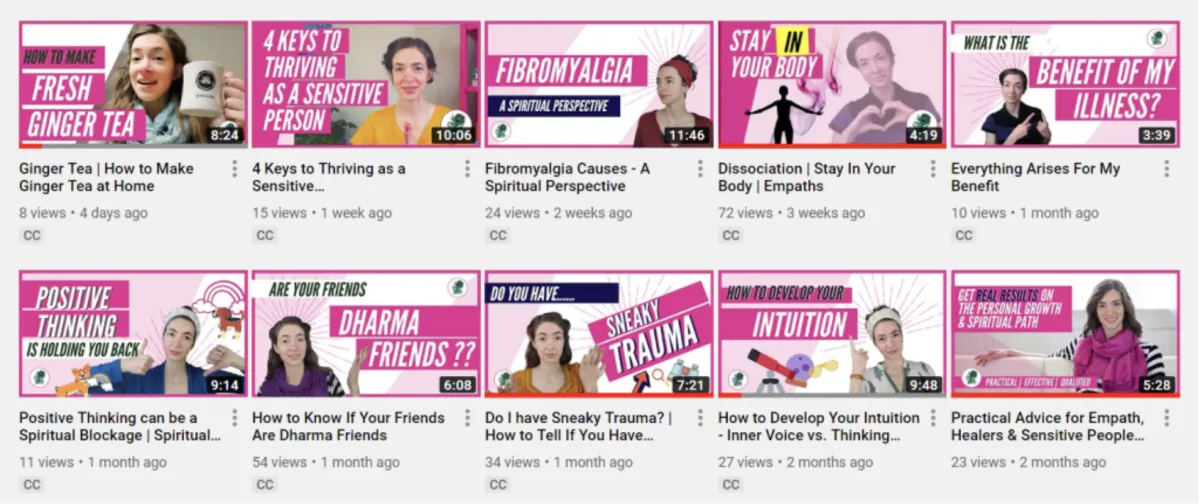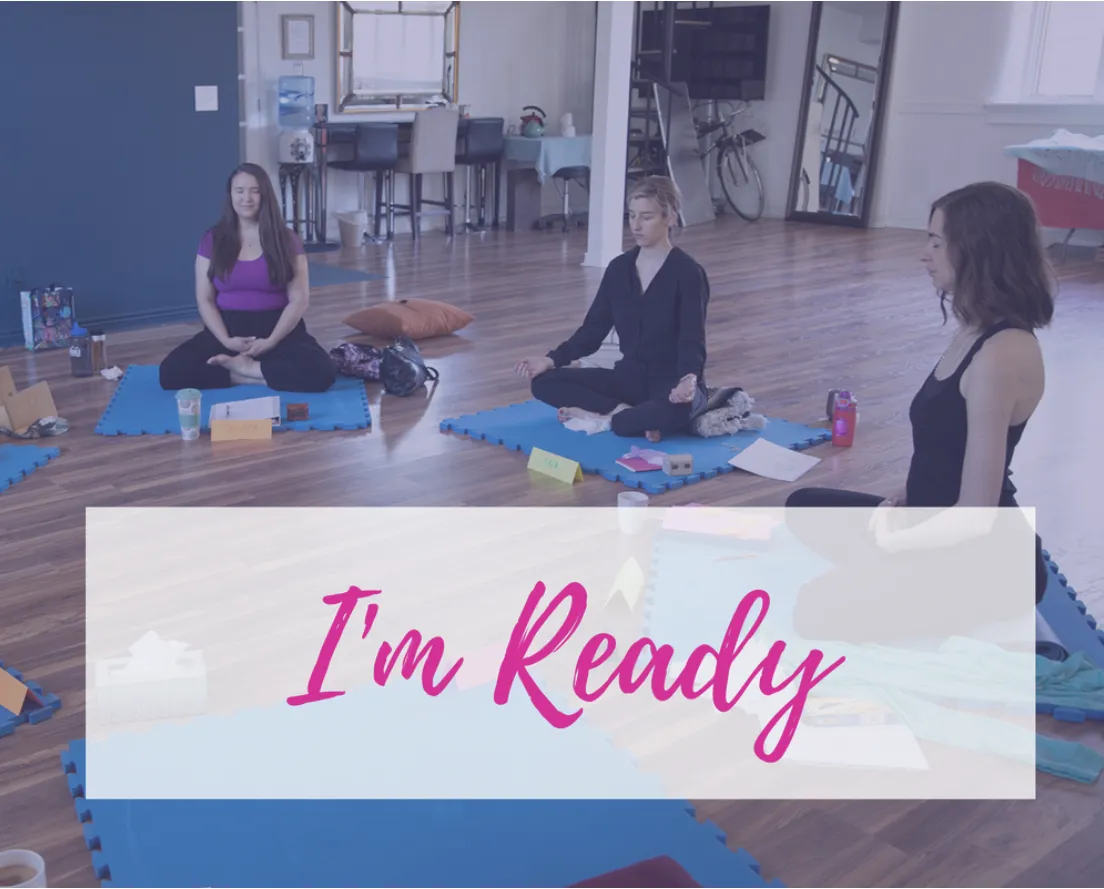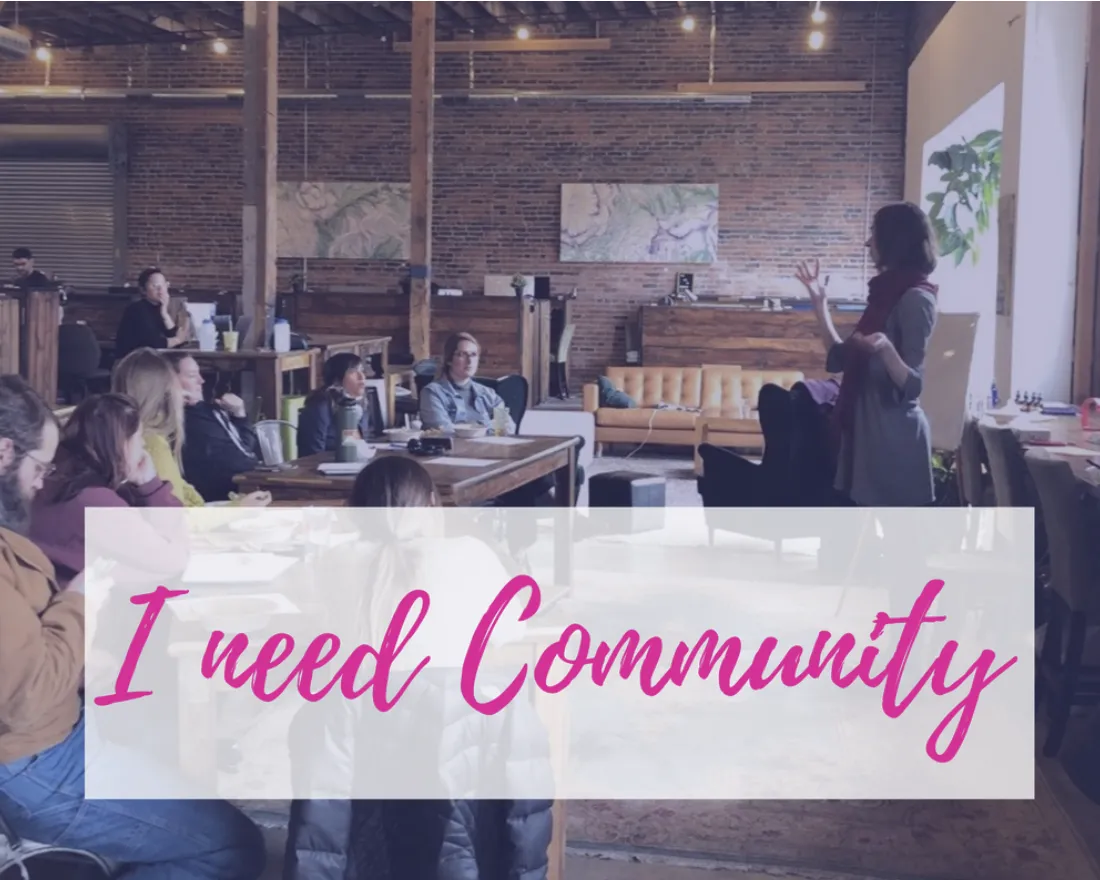Leslie Huddart L.Ac.
Are you an Empath, Healer or
Highly Sensitive Person?
You CAN harness your Super Powers without the Overwhelm. I'll show you how.
Release the Trauma Trapped in Your Body...(without years of therapy)...
Watch The Video And Click On What Resonates With You
--------->>>

Julia
Holistic Health Coach
"I had tried therapy for over 10 years with no huge life-changing results...
I finally, for the first time, feel free from life long issues that were holding me back."

Christine Nguyen
"Leslie is a true healer... no one else can do what she does."
Ready to Go beyond Therapy to True Healing?
You've done a lot of training.
You know a lot of stuff.
Heck, you even help others with healing.
Do you still feel like...?
"...I should have it all together already. "
"...I should feel confident but I feel like an imposter ."
"...I should have this career thing dialed in already."
"...I should be over this family baggage $%^t. already."
"...I should have found my soul mate by now."
Are you a healer, empath or sensitive person and:
You've Done Therapy (and found it was helpful but it didn't quite get you to where you want to be)
You've Done Tranings and Certifications (life coaching, yoga teacher, nutrition, reiki.....you name it, but are still struggling with some things)
Your life looks good from the outside (but you feel like an imposter, like something is missing or not quite right)
You may have a Subtle Body Block.

Your subtle body is the technical side of how your mind-body-spirit system actually work together to allow you to be a healthy, happy human being with great relationships and a sense of inner peace.
If you've got old trauma trapped in your system or unconscious blocks to success messing up your subtle body wiring, you can do all the best acupuncture, counseling, yoga classes and life coaching in the world and your results will still be limited. This is because,
The health and function of your Subtle Body is the biggest factor in how quickly & easily you can create the life of your dreams.
Are you dealing with anxiety?
Imposter Syndrome or confidence issues?
Old family patterns?
Have you been trying to find your soulmate or
launch your successful business ?
.......your subtle body is either your super power or your biggest block.
The good news, is that just like every other system of the body, the subtle body has it's own operating system with it's own rules and solutions. I can show you how. You absolutely can heal and step into creating the life you know you're meant to live (often more quickly than you even thought possible!)
The problem is that subtle body wiring is not common sense and the information isn't readily available. (They don't teach this stuff in counseling programs or acupuncture schools).
Sound Interesting?
Welcome, I'm Leslie.
I am a natural health expert and spiritual guide who combines ancient healing wisdom, modern neuroscience and mindfulness to get you healing results where other methods have failed.
My specialty is helping fellow healers and empaths take the shortcut to personal success, soul alignment, true confidence and freedom from anxiety and insecurity.
Together, we'll heal and release the issues
stuck in your mind-body-spirit system that
have been secretly holding you back.
Leslie Huddart MAOM, L.Ac.
Results From My Clients

"I have a clear vision of what I actually need and that feels really good.
Now when triggers come up, I'm able to easily work through them and let them go, instead of it being the thing that I do for three days."
-Heidi
TedX Organizer

"Now, when something shakes me... I know what to do about it and that in itself is very empowering. I get the benefit of doing the work and releasing it.
I feel like I've gotten a special behind-the-scenes tour of empowerment."
-Michelle
Art Therapist

"From the moment we met, I knew I was in the right hands...Leslie and I worked together to heal the layers of physical, emotional and mental imbalances, focusing on a deep spiritual connection to myself and my body.
I immediately noticed improvement in the way I felt and so many of my long term issues and beliefs began to unravel in the most postive way.
Now, months later, I feel like a whole person aagin. I have a stronger relationship with myself, my choices, and what I allow in my body. I can't remember a time when I felt this healthy!"
-Scott

"I decided to do this training because I was ready for the next level in my life and needed a little help to get there.
Now, I’m able to live more in my body instead of up in my head and tap into my body and what it needs, as it arises.
I have a lot less anxiety. I'm just calmer and more peaceful in my everyday life. "
- Katie
Mother of Two,
Business Owner

"It's an opportunity to really face things like traumas, illness and physical pain, in a safe place, and begin to understand the lessons and messages from the Universe / Your Spirit, that those things hold and find way to integrate them and love ourselves and the power we have inside."
-Mary
Denver, CO

"I knew that I was struggling with being around conflict and suffering, yet in my work as a nurse I am unable to avoid these things. Leslie taught me an amazing technique for grounding myself and diffusing conflict, that I can easily use in my everyday life. "
-Nea
Registered Nurse

"I notice that I’m less scattered and more present. I question less the choices I make on a day to day basis. I feel like I have more energy and vitality for things.
I’d like to recommend it to a lot of people.
The material doesn’t just stay at the head, that it really drops into the body where I think we can really take it on and see what that means for us. "
-Mica G.
Equine Therapist
I know what it's like to struggle with this issues because I've been there myself.
I'm grew up as a sensitive, un-guided empath struggling with family dynamics, an unbalanced relationship with food and disappointing romantic relationships with men. All these struggles pushed me to dive into yoga, spiritual study and the healing arts.
Over the past 10+ years of working with clients in my mind-body healing & natural health practice I've developed a system of working with the subtle body that will amplify your healing to help you get to where you're truly meant to be.
I'm here to personally help you
-become who you actually are and
-get your gifts out into the world
without decades of therapy or endless self-help seminars.
Which Describes Your Situation?
Stop simply hoping things might manifest.
You're ready to dissolve the obstacles that are blocking your success.
Client Experiences from Subtle Body Certification at the Body Wisdom Academy:
It's time for something different.
It's time to get you
REAL
LIFE
RESULTS

"I’ve really learned how to receive and how to not overplan or overcontrol.
It’s really helped me to just not overburden myself with things that aren’t necessarily mine to do...really learning good boundaries in life and good communication skills as well.
It’s really helped."
- Meredith

"I can connect with myself way faster than I was able to before. I have a quicker recovery time whenever I experience anything that’s triggering...
I have some real tools and a sense of confidence in using those."
-Mary

"Leslie is amazing. She has helped me with several issues. During my sessions with her I felt as though the molecules of my cells were being transformed.
She has a great deal of knowledge about various healing modalities. She has a gentle and welcoming presence.
I have often referred my own clients to her. She has a special and intuitive gift. "
-Mary
We're constantly adding to share our all of our clients' successes. Click the button below to see even more client success stories.
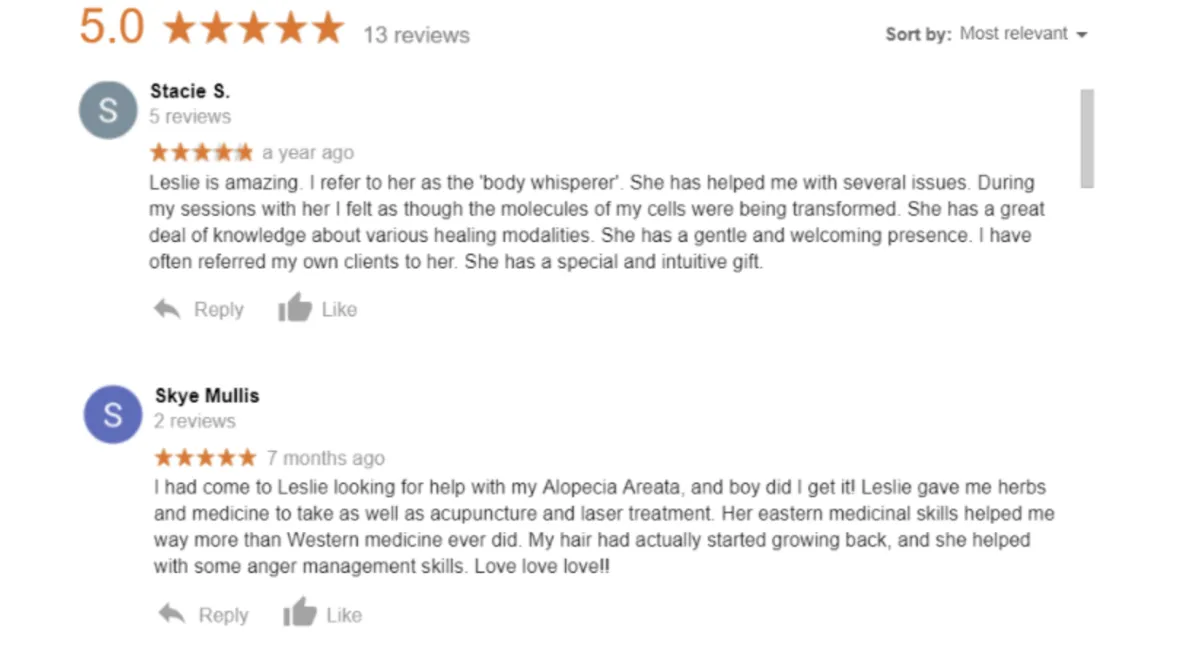
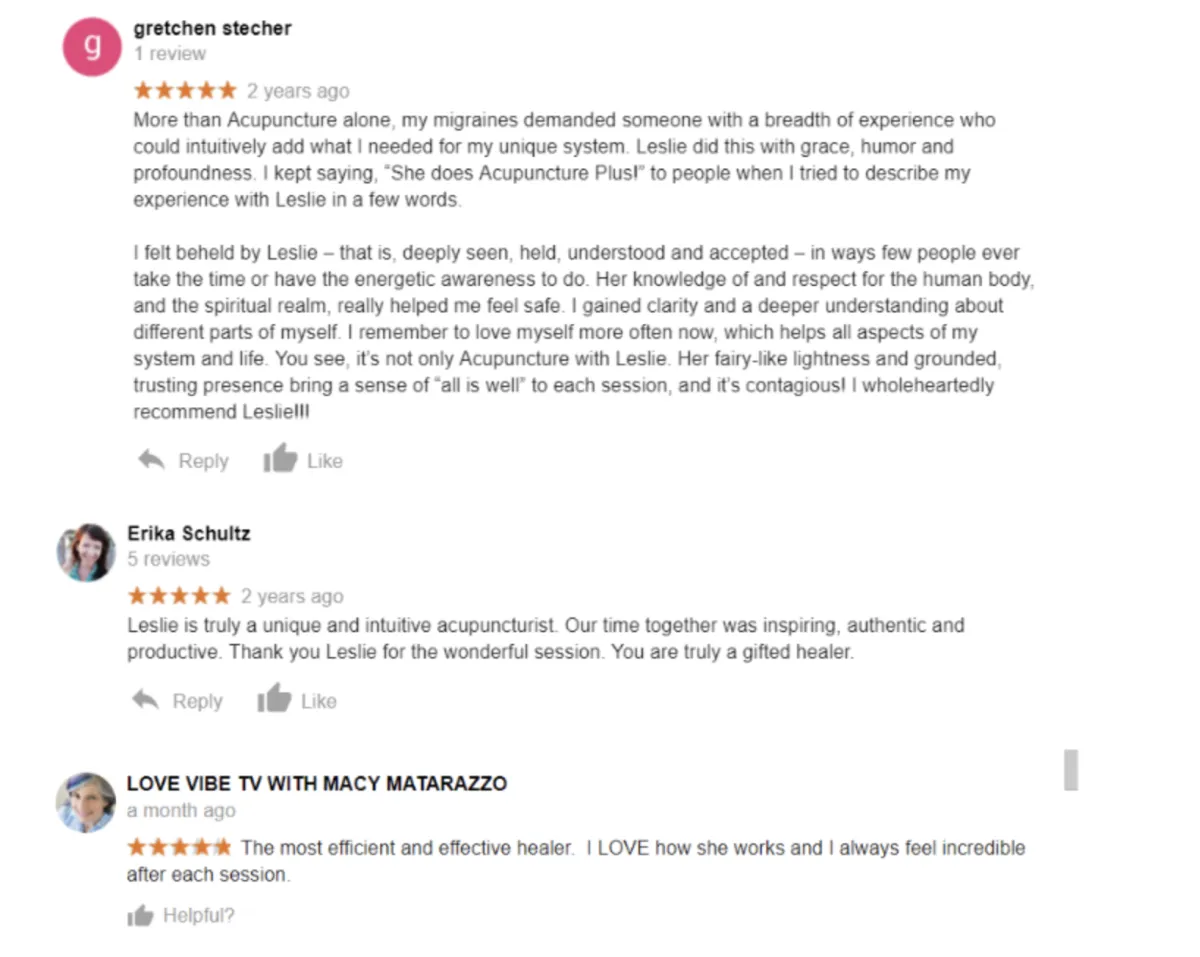
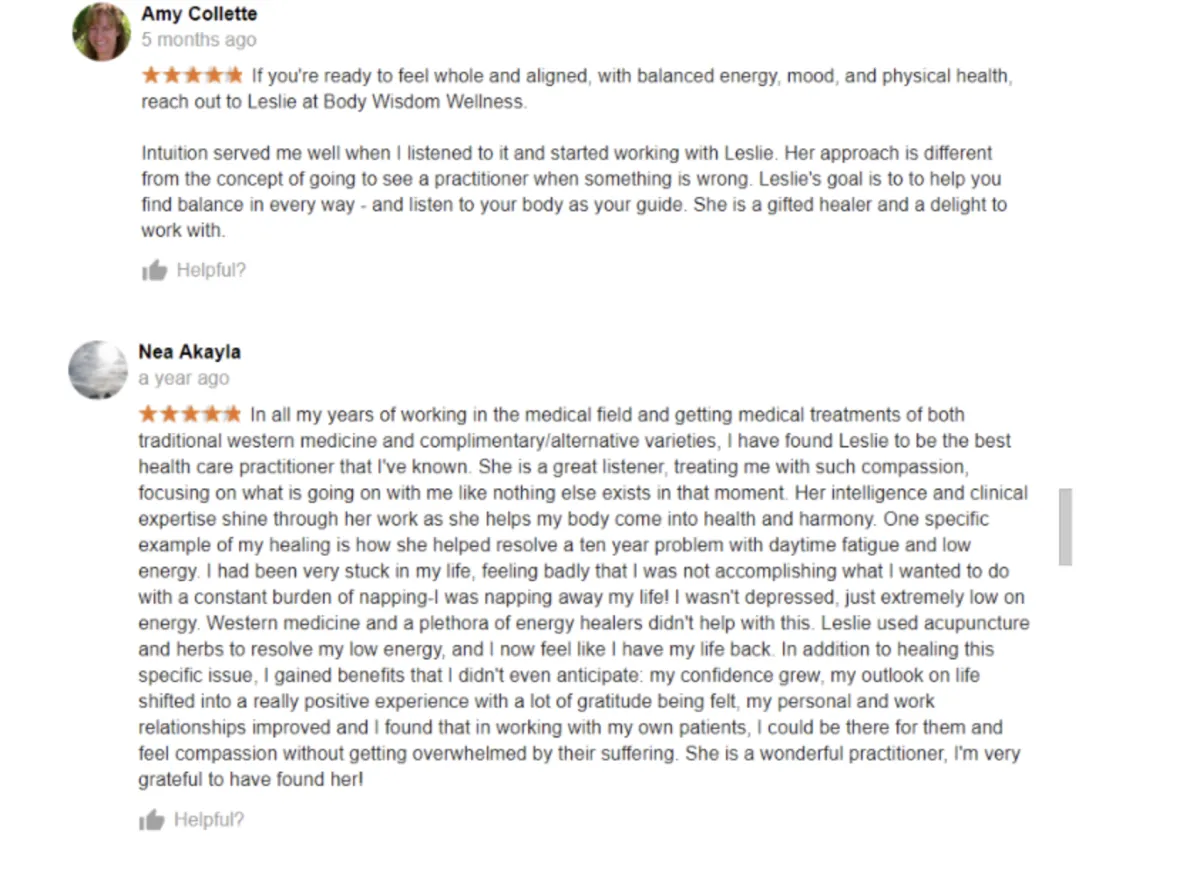
Leslie Huddart L.Ac. YouTube Videos
